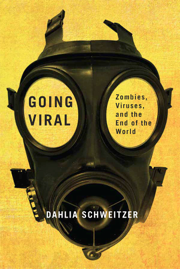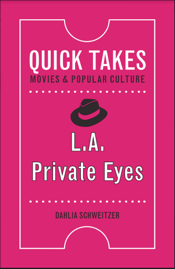
About Dahlia
DAHLIA SCHWEITZER is a pop culture critic, writer, and professor. Described by Vogue as “sexy, rebellious, and cool,” Schweitzer writes about film, television, music, gender, identity, and everything in between. She studied at Wesleyan University, lived and worked in New York City and Berlin, and completed her MA and PhD at the Art Center College of Design and UCLA. She is currently chair of the Film and Media department at the Fashion Institute of Technology in New York City.
In addition to her books, Dahlia has essays in publications including Cinema Journal, Journal of Popular Film and Television, Hyperallergic, Jump Cut, Quarterly Review of Film and Video, and The Journal of Popular Culture. She has also released several albums of electronic music, including Plastique and Original Pickup.

Professor
As a professor of film and media studies, Dahlia exposes her students to a variety of theoretical approaches and cinematic techniques, asking them to approach both with analytical inquisitiveness. Her aim is to pass her own curiosity on to her students, encouraging them to think across their classes and experiences to create intellectual connections between course materials and the world in which they live. She strives to remind her students that the loudest voice is not necessarily correct, and in so doing, helps them find their own.

Media Critic
Declared “one of the world’s leading analysts of popular culture” by renowned author Toby Miller, Dahlia writes about film, television, music, gender, identity, and everything in between. Her work can be found across mainstream, academic, and emergent channels in both long and short form. Repeatedly drawn to popular culture, Dahlia loves to analyze and unpack cultural artifacts in order to explore how they reflect social and historical issues, as well as looking at how they reinforce or interrogate common cultural assumptions.

Author
Dahlia has written numerous books exploring aspects of film and television. Regardless of the topic—serial killers, private detectives, or even zombies—all of her writing engages directly with questions of self versus other, private versus public space, examining depictions of gender, identity, and race. She traces how these depictions evolve and examines what they mean about our changing world. In her latest project, Dahlia explores the ways haunted homes have become a venue for dramatizing anxieties about family, gender, race, and economic collapse.
Blog
It’s Just Hair
One of my friends has been battling breast cancer this year. First she lost her hair, and then she lost her breasts. She commented on how the loss of both forced her to redefine (to re-find) her femininity, since what defines a woman's sexuality--her very status as a woman--more conspicuously than her breasts and her long, flowing hair? This got me thinking about what it would be like to be forced to lose both. What would it be like to stand alone, without the buffers of either? It would be a...
On World Teacher’s Day, Support Humane Treatment of Educators
Much has been written about the plight of adjuncts... On how the use of part-time faculty, with no job security or benefits or a liveable salary, has grown in the United States over the last thirty years... On how, in 1975, only 30.2 percent of faculty were employed part time; by 2005, according to data compiled by the AAUP from the Integrated Postsecondary Education Data System (IPEDS), part-time faculty represented approximately 48 percent of all faculty members in the United States... On...
Pretty Little Transgenders
[SPOILERS AHEAD!] Back when Basic Instinct premiered in 1992, it was met with massive outcry by many in the GLBT community who alleged that it portrayed lesbians as violence-prone killers and deviates. Rita Addessa, executive director of the Philadelphia Lesbian and Gay Task Force, argued that commercial films are "grounded in men's hatred and fear of women." "At great risk of increasing interest in movies like Basic Instinct, I felt morally compelled to organize a public response. The public...




